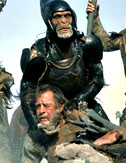
Movie Guru Rating:

Comment
on this review
| |

Some things may be better left alone
by Zak Weisfeld
Why have we returned to the Planet of the Apes? Why now? When the first Planet was released, in 1968, the world seemed ripe for its blend of sci-fi camp and radical politics. America was torn by race riots, divided by the Vietnam war, and rightfully horrified at the odds of a civilization ending nuclear war. Planet of the Apes, for all its bad monkey make-up and Hestonian melodrama, was as gripping, and trippy, as the era that spawned it. Now, in 2001, with an underwhelming Y2K in the rear-view mirror and the definitely happening, (except to oil executives and presidents) but strangely abstract, global warming as our civilization-ending threat-du-jour, a visit to the prehensile planet seems, at best, perplexing. And at worst, tacky.
Even stranger is that Tim Burton would be the one to take us there. I remember, several years ago, that Planet was on the plate of Oliver Stone. And it seemed to fit. Stone had the bombast, the retro-lefty politics and the love of a big statement to make Planet of the Apes screech again. But Burton?
It's hard to imagine a less political, more personal, mainstream filmmaker than Tim Burton. Burton's best films, Ed Wood and Edward Scissorhands, reveal more than just a penchant for Johnny Depp and the name Ed—they are both deeply concerned with the outsider forced to choose between conformity or exile, and choosing exile. They were about Burton himself, about the misfit, the odd-looking artist in a town of great looking hacks. At least they were about the old Tim Burton. With Planet of the Apes, Burton seems to have turned over a new leaf and chosen conformity. It's the wrong choice.
In Burton's Planet (which bills itself as a "revisioning" rather than a remake) Mark Wahlberg plays Captain Leo Davidson of the US Air Force. After launching his space pod into a swirling galactic storm in search of his chimpanzee predecessor, Captain Davidson crashes into a mysterious jungle planet. And what do you know—the first people he meets are the ultra-craggy Kris Kristofferson and the ultra-nubile Estella Warren both of whom look like they are desperately trying to escape from a Mötley Crüe concert. Instead, it turns out they're being chased by apes.
Pretty soon Wahlberg and the crimp-haired humans end up in a cage and are led through a city that is a veritable utopia of ape integration—chimpanzees, gorillas and orangutans living side by side, playing and working together. It's a happy sight, like a gentrified Ewok village. But it's not a great place for humans who are forced to work as slaves for the cruel ape masters.
But slavery is no place for Marky Mark and pretty soon, with the help of a Helena Bonham Carter incarnated chimp, he and the supermodel (along with the obligatory kid and black guy) are off on a chase that lasts pretty much the rest of the movie. Pursuing them is a wicked, knuckle-thumping chimp general named Thade. Played by Tim Roth with a leering zeal that would make a vaudeville mustache twirler blush, Thade's entire purpose in the movie seems to be to utter the line that caps the trailer, "Kill them all." And who could blame him.
The banal chase comes to a blasé conclusion as the monkeys and the men face off in a final battle in the desert (don't worry, I'm not revealing any of the movie's tragically obvious twists) preceded by the now obligatory computer-generated wide-shot of the army marching across a dusty plain. Except for the inadvertent hilarity of another computer animated shot of hundreds of chimp and gorilla bodies blasted into the air, the finale is notable mostly for its pointlessness and incoherence, which makes it fit seamlessly with the rest of the film.
Apparently, politics wasn't the only thing about the original that was felt to be too slow for today's audiences. Story and character went into the dumpster right on top of them. What's left is a script as stiff and unconvincing as Roddy McDowell's monkey head in the original. For instance, Wahlberg's main dilemma is to choose whether to hunker down next to the smart, brave, overly-dramatic and slightly furry Helena Bonham Carter chimp or the busty, smooth-skinned, empty-eyed supermodel. A dilemma indeed.
In fact, the only place where Planet hasn't clearly devolved in the 33 years since it's release is in the make-up and the costuming. Rick Baker's apes are impressive to behold—and it's clear that many of the actors actually make an attempt to keep their simian creations simian.
But where Planet really shines is the design. Here, at least, Burton feels at home. His ape armor is beautiful stuff, all gilt and oiled leather. It's enough to make any monkey proud. Another nice addition to the mix are the aerial effects of Hong Kong action movies as digested by the Matrix and Crouching Tiger. The leaping and climbing give Planet's apes an explosive simian grandeur that marks one of the movie's few improvements over its ancestor.
None of this is enough to justify this re-whatevering of Planet of the Apes, though. Gutted of its message, and transported to another time, Planet of the Apes is about little more than the philosophical question of what kind of hats monkeys would make for themselves if they ran the world. The answer, I was interested to note, was very cool hats indeed.

August 2, 2001 * Vol. 11, No. 31
© 2000 Metro Pulse
|





